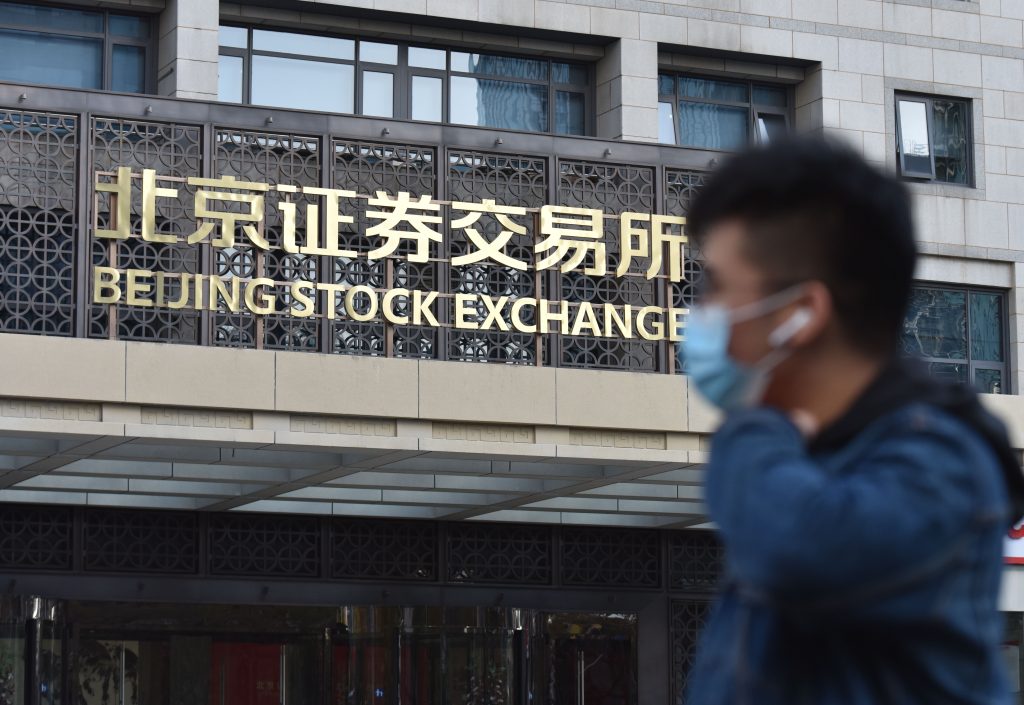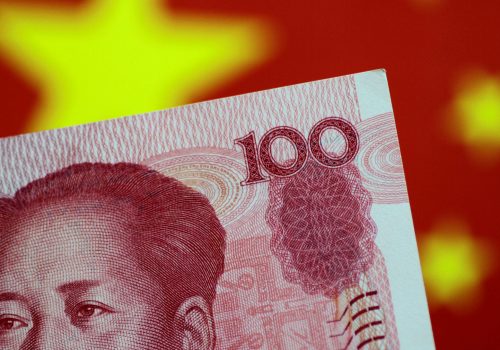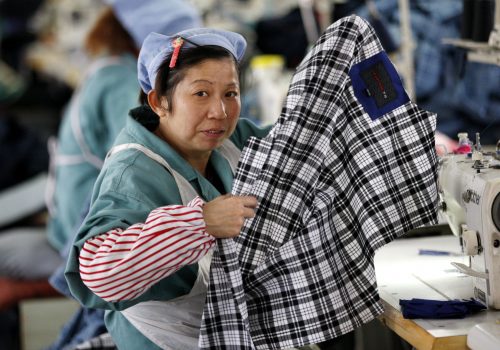US-China financial ties are fraying as conflicting national concerns about technology transfer, corporate transparency, and data security threaten everything from Wall Street trading in Chinese corporate giants to American venture-capital investments in China’s startups. But as Washington navigates the road ahead, it should keep a focus on national-security threats and avoid the temptation to push the two countries onto completely divergent paths that could raise the risk of financial-market instability.
The pressure to separate the two countries’ financial markets came to a head over the past year, mirroring the centrifugal political forces that are straining bilateral trade in technology and other goods. This doesn’t necessarily portend the imminent decoupling of the two superpowers’ financial markets, but with recent calls in Washington for new restrictions on investments in China, the potential for disruption is increasing.
This inevitably raises the question of how far each government is prepared to go. Washington has to calibrate whether it is willing to risk that market instability and whether it wants to face a backlash from powerful US financial interests who are happy to make money in China. And Beijing will have to decide whether it’s truly prepared for its companies to lose access to US stock markets just as its own slowing economy faces the pressure of a deepening property-market downturn.
The links between US and Chinese financial markets never appeared tighter than early last year. China’s companies launched a wave of Wall Street initial public offerings (IPOs) in the first half of 2021, helping Chinese stocks on US exchanges hit record highs in February. Foreign capital surged into China’s markets—especially government bonds—as the country’s economy recovered from its pandemic-induced 2020 slowdown and as US venture capitalists pumped money into Chinese startups at close to the pre-pandemic pace.
But as 2021 progressed, both countries’ governments hit the brakes on Chinese IPOs in New York, as China cracked down on the tech giants that had become the darlings of Wall Street and the United States started the clock on a process that could delist every Chinese company from US markets by 2024 because China refuses to abide by disclosure rules.
Actions like these have already reduced the market capitalization of Chinese companies listed on Wall Street by some six hundred billion dollars, and those losses likely will mount as more Chinese firms shift their listings to China’s stock markets. Already, twelve of the fifteen largest Chinese companies traded in the United States have launched secondary listings in Hong Kong, and many US institutional investors have shifted their holdings away from the New York markets.
Nonetheless, US institutional investors continue to buy substantial amounts of Chinese government bonds and stocks on the other side of the Pacific, and Chinese holdings of US government securities consistently top one trillion dollars. Neither government so far is taking aim at those bedrock investments. But China’s economic problems have unnerved some US investors over the past year, suggesting that investments in China may be more fragile than many analysts have assumed. Witness January’s declines across all Chinese asset classes, which sent China’s stock markets into their first bear market since 2019 and left many US investors with their portfolios exposed. The question is how investors will react if there are more shocks.
Now there are signs that more market restrictions may loom. Influential voices in Washington have begun advocating—and trying to legislate—unprecedented oversight of US venture-capital activities in China. That seed money has played an important role in funding Chinese industries ranging from semiconductors to biotechnology, and one industry estimate shows that around one third of all Chinese venture-capital deals by value in recent years include US investors. A second industry report places total 2021 investment in China by Chinese and foreign venture-capital firms at a record-smashing $130.6 billion.
In a July 2021 speech, US National Security Advisor Jake Sullivan said the Biden administration is “looking at the impact of outbound US investment flows that could… enhance the technological capacity of our competitors in ways that harm our national security.”
The US-China Economic and Security Review Commission’s (USCC’s) annual report, released in November, recommended executive-branch and congressional actions to strengthen regulations focused on flows of venture capital and other forms of investments to China’s military-industrial ecosystem.
Other types of investment in China facing scrutiny are securities based on market indices that include Chinese stocks and bonds, which generate large amounts of passive institutional investment. The USCC has called for index providers and derivatives based on indices to be subject to regulation by the US Securities and Exchange Commission (SEC), expressing concern about damage to US economic and security interests.
The Trump and Biden administrations already prohibited investments in securities of Chinese companies accused of supporting China’s military, causing major market indices to delete those companies.
Beijing is also moving to impose additional curbs on financial-market interactions, in this case restrictions that will affect the legal basis of future Chinese IPOs. Regulators have proposed rules to limit overseas share issues based on variable interest entities, shell companies that have operated in a gray area of Chinese law and enabled billions of dollars of Wall Street IPOs. Last July’s decision by SEC Chairman Gary Gensler to pause Chinese IPOs was partly based on concerns about the risks to investors associated with that legal stratagem.
Beijing’s qualms about Chinese companies’ presence in—and dependence on—US capital markets also are grounded in national-security considerations. Over the past year, the Chinese government has put in place data-protection laws aimed at tightly controlling the use of corporate data in China and its transfer abroad. At the same time, Chinese government agencies have promulgated regulations strengthening oversight of shares listed overseas.
China is in the final stage of mandating that government cybersecurity reviews be required for all companies with at least one million online users that are seeking to issue shares abroad. The clear implication is that Beijing will no longer be open to large e-commerce platforms with hundreds of millions of users listing in the United States.
Beijing is also using its concern about data security to deepen its objections to Washington’s demands to inspect the books of already-listed Chinese companies. This is only likely to further complicate the more than decade-long standoff over corporate disclosure. Under the Holding Foreign Companies Accountable Act (HFCAA), passed unanimously by the US Congress in 2020, Chinese companies can no longer avoid the scrutiny that all other companies listed in the United States endure.
Beijing has consistently treated disclosure of government investments and Chinese Communist Party officials in company management, required under the new US law, as impinging on national security. Writing in the state-owned Economic Daily News on January 6, Zuo Xiaodong, vice president of the Chinese Academy of Information Security, asserted that SEC demands for access to audit documents could lead to “all sensitive data” of listed companies being “lost abroad.”
The SEC’s Public Company Accounting Oversight Board last month issued a determination that it has been unable to inspect or investigate sixty-three public accounting firms in China and Hong Kong that conduct audits of Chinese-listed companies, the first step under the HFCAA toward an SEC determination that it cannot audit the 2021 accounts of Chinese-listed companies. Three consecutive years of such findings will lead to delisting, an outcome that appears inevitable despite Chinese government assertions of progress in recent talks with the United States on the issue. (China is the only country that refuses to allow audits of US-listed companies’ books.)
In apparent anticipation of this outcome, the Hong Kong Stock Exchange already has loosened the rules for companies to make secondary listings, a move that could open the door to at least twenty-seven of the largest New York-listed Chinese companies, according to Goldman Sachs (many smaller companies still don’t qualify). In addition, Beijing is expected to allow Chinese retail investors to buy shares in those secondary listings in Hong Kong—potentially boosting trading—once more companies have made the move from Wall Street. Meanwhile, China has opened a new stock exchange in Beijing focused on smaller technology companies, adding to technology-oriented boards in Shanghai and Shenzhen.
For Chinese corporations that once commanded a global stock-market capitalization of more than two trillion dollars on Wall Street, the issue becomes whether the process of separation will accelerate. With China’s banking system strained by the problems of its property sector and domestic consumption slowing in the face of pandemic-related shutdowns, there may be less money to go around than Beijing’s bureaucrats imagine.
As with trade sanctions against China, the best course for US policy would be to retain a singular focus on technologies with national-security implications, including those being funded by venture capital. Policymakers should resist the impulse to target financial-market ties writ large, given the uncertain impact on market stability. That will best serve US national-security interests and perhaps spare this rift from becoming a complete rupture.
Jeremy Mark is a senior fellow with the Atlantic Council’s GeoEconomics Center. He previously worked for the International Monetary Fund and the Asian Wall Street Journal. Follow him on Twitter @JedMark888.
Further reading
Mon, Dec 13, 2021
China’s real ‘debt trap’ threat
New Atlanticist By Jeremy Mark
Chinese debt relief could help many indebted countries—but failure to act would ensnare both foreign borrowers and Chinese lenders.
Tue, Dec 21, 2021
Can China’s Communist Party defuse its demographic time bomb?
New Atlanticist By Dexter Tiff Roberts
For both China’s leaders and its people, the trials of an aging population will define the decades to come.
Mon, Jan 31, 2022
China Pathfinder: Q4 2021 Update
Issue Brief By
Over the past ten months, teams from the Atlantic Council and Rhodium Group have taken a dive into China’s economy to address a fundamental question: Is China becoming more or less like other open-market economies?
Image: Beijing stock exchange building seen in Beijing. on November 14, 2021. (Photo by Sheldon Cooper / SOPA Images/Sipa USA via Reuters)



